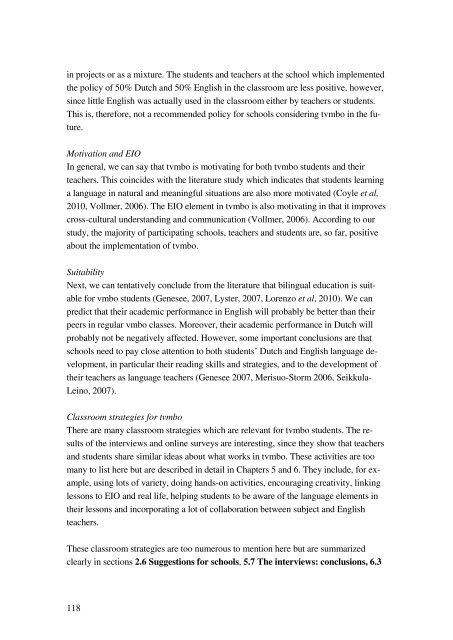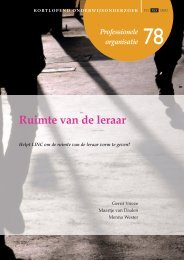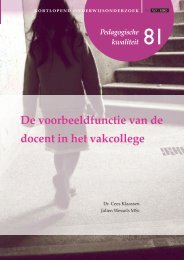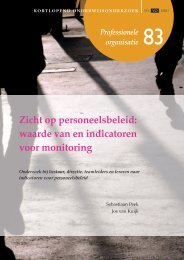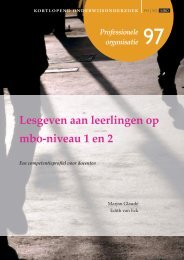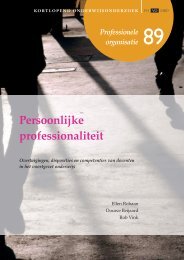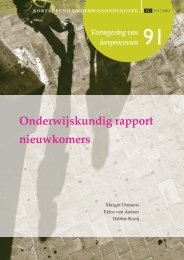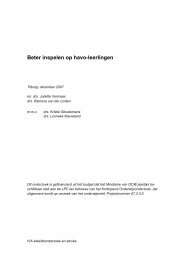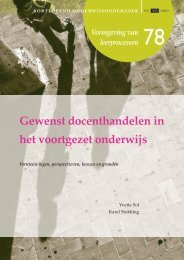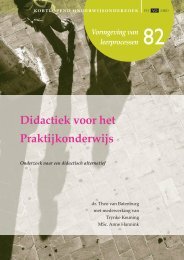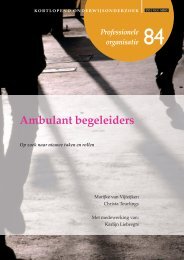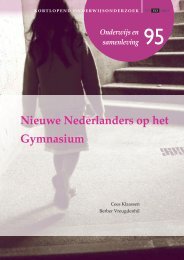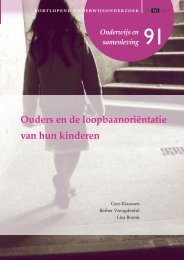Proud to be tvmbo - Kortlopend Onderwijsonderzoek
Proud to be tvmbo - Kortlopend Onderwijsonderzoek
Proud to be tvmbo - Kortlopend Onderwijsonderzoek
Create successful ePaper yourself
Turn your PDF publications into a flip-book with our unique Google optimized e-Paper software.
in projects or as a mixture. The students and teachers at the school which implemented<br />
the policy of 50% Dutch and 50% English in the classroom are less positive, however,<br />
since little English was actually used in the classroom either by teachers or students.<br />
This is, therefore, not a recommended policy for schools considering <strong>tvmbo</strong> in the future.<br />
Motivation and EIO<br />
In general, we can say that <strong>tvmbo</strong> is motivating for both <strong>tvmbo</strong> students and their<br />
teachers. This coincides with the literature study which indicates that students learning<br />
a language in natural and meaningful situations are also more motivated (Coyle et al,<br />
2010, Vollmer, 2006). The EIO element in <strong>tvmbo</strong> is also motivating in that it improves<br />
cross-cultural understanding and communication (Vollmer, 2006). According <strong>to</strong> our<br />
study, the majority of participating schools, teachers and students are, so far, positive<br />
about the implementation of <strong>tvmbo</strong>.<br />
Suitability<br />
Next, we can tentatively conclude from the literature that bilingual education is suitable<br />
for vmbo students (Genesee, 2007, Lyster, 2007, Lorenzo et al, 2010). We can<br />
predict that their academic performance in English will probably <strong>be</strong> <strong>be</strong>tter than their<br />
peers in regular vmbo classes. Moreover, their academic performance in Dutch will<br />
probably not <strong>be</strong> negatively affected. However, some important conclusions are that<br />
schools need <strong>to</strong> pay close attention <strong>to</strong> both students’ Dutch and English language development,<br />
in particular their reading skills and strategies, and <strong>to</strong> the development of<br />
their teachers as language teachers (Genesee 2007, Merisuo-S<strong>to</strong>rm 2006, Seikkula-<br />
Leino, 2007).<br />
Classroom strategies for <strong>tvmbo</strong><br />
There are many classroom strategies which are relevant for <strong>tvmbo</strong> students. The results<br />
of the interviews and online surveys are interesting, since they show that teachers<br />
and students share similar ideas about what works in <strong>tvmbo</strong>. These activities are <strong>to</strong>o<br />
many <strong>to</strong> list here but are descri<strong>be</strong>d in detail in Chapters 5 and 6. They include, for example,<br />
using lots of variety, doing hands-on activities, encouraging creativity, linking<br />
lessons <strong>to</strong> EIO and real life, helping students <strong>to</strong> <strong>be</strong> aware of the language elements in<br />
their lessons and incorporating a lot of collaboration <strong>be</strong>tween subject and English<br />
teachers.<br />
These classroom strategies are <strong>to</strong>o numerous <strong>to</strong> mention here but are summarized<br />
clearly in sections 2.6 Suggestions for schools, 5.7 The interviews: conclusions, 6.3<br />
118


